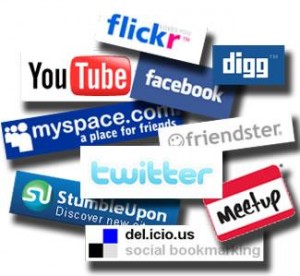The New Frontiers of Social Marketing: A Discussion by Dr. Craig Lefebvre
 Social networking has changed the way individuals interact with and relate to each other. Thanks to Facebook, Twitter, and yes, even MySpace, we are now able to reconnect with lost acquaintances and meet new ones via shared interests, all while sitting on our couch. Say what you will about impacts on face-to-face interactions; networking over the Internet is now the new normal. This trend can, and should, be harnessed for reasons beyond playing Farmville. If leveraged appropriately, social media can have a powerful influence on people’s health behaviors and practices.
Social networking has changed the way individuals interact with and relate to each other. Thanks to Facebook, Twitter, and yes, even MySpace, we are now able to reconnect with lost acquaintances and meet new ones via shared interests, all while sitting on our couch. Say what you will about impacts on face-to-face interactions; networking over the Internet is now the new normal. This trend can, and should, be harnessed for reasons beyond playing Farmville. If leveraged appropriately, social media can have a powerful influence on people’s health behaviors and practices.
Recently, Dr. Craig Lefebvre, a research professor at the University of South Florida and the lead change designer at RTI International, gave a presentation at the George Washington University titled “Frontiers of the New Social Marketing.” Part of GW’s Health Communication and Marketing symposium series, the fascinating presentation provided compelling reasons to invest in social marketing practices for public health purposes. Note that the lecture referred to social marketing, not networking, and theoretically and practically there is a vast difference. Those attempting to promote public health aren’t so much interested in sharing selfies as they are sharing tips and resources, valuable information that can effect change.
From a desktop in Washington, a public health professional wielding a Twitter account can reach persons from Kiev to Kinshasa, Manila to Managua. The growing field of m Health, mobile health, takes advantage of the fact that mobile devices are prolific across the globe, even in areas where infrastructures and living conditions are poor. Even if not literal smart phones, these cell phones can receive text messages via social media alerts. This means that life-changing, life-saving health information can be relayed to a huge population that may not have access to the health resources of more developed countries. And potentially within 140 characters or less.
As Dr. Lefebvre emphasizes, though, marketing is different from networking. When networking via Tumblr or LinkedIn, we’re actively trying to get to know a person, trying to engage with someone and let the conversation grow organically. Marketing is more targeted. Young mothers far removed from maternal health facilities don’t want to chat, they want information. And part of being able to convey that information to them effectively and meaningfully is meeting them where they’re at, so to speak. What types of social media do they use, and how do they use it? Communicating in the right language is obvious, but the “cyber vernacular” of a population is less so, though likely just as important – what sort of abbreviations, LOLs and BRBs, are used? Do emojis work better for some groups than others? Are Facebook blasts taken seriously? If you’re going to engage in social marketing via social networks, then yes, you need to do your market research, just as seriously as anyone on Madison Avenue would.
I do wonder whether the marketing-networking distinction is that strong, however. A friend of mine who does social media marketing for a publishing company described it as a cocktail party – she doesn’t “walk right up to someone” on Twitter and push a book, she engages them in conversation first, opens them up, then makes her pitch. Maybe if marketing a particular good, like vaccinations or clean water kits, such massaging isn’t necessary. But when trying to reach a group of people to change ingrained health practices like hygiene and sexual activity, marketing disguised as networking may prove more effective. Regardless, Dr. Lefebvre is absolutely right – the power of social media cannot be ignored, nor underestimated, by those of us invested in global health. We need to use it, and use it the right way.







Leave a Reply
Want to join the discussion?Feel free to contribute!